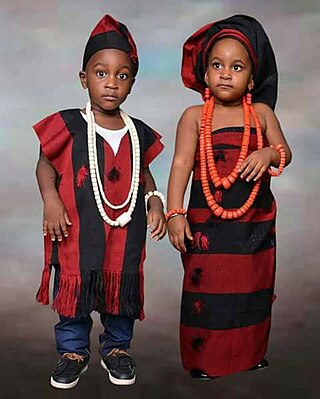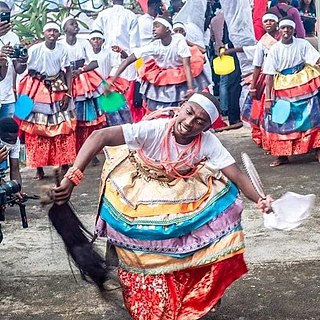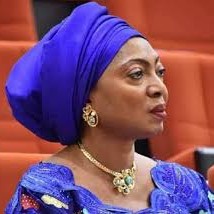Related Research Articles

Cross River State is a state in the South-South geopolitical zone of Nigeria. Named for the Cross River, the state was formed from the eastern part of the Eastern Region on 27 May 1967. Its capital is Calabar, it borders to the north through Benue state, to the west through Ebonyi state and Abia state, and to the southwest through Akwa Ibom state,while its eastern border forms part of the national border with Cameroon. Originally known as the South-Eastern State before being renamed in 1976, Cross River state formerly included the area that is now Akwa Ibom state, which became a distinct state in 1987.

Benue State is one of the North Central states in Nigeria with a population of about 4,253,641 in 2006 census. The state was created in 1976 among the 7 states created at that time.The state derives its name from the Benue River which is the second largest river in Nigeria. The state borders Nasarawa State to the North; Taraba State to the East; Kogi State to the West; Enugu State to the South-West; Ebonyi and Cross-Rivers States to the South; and has an international border with Cameroon to the South-East. It is inhabited predominantly by the Tiv, Idoma and Igede. Minority ethnic groups in Benue are Etulo, Igbo, Jukunpeoples etc. Its capital is Makurdi. Benue is a rich agricultural region; popularly grown crops include: oranges, mangoes, sweet potatoes, cassava, soya bean, guinea corn, flax, yams, sesame, rice, groundnuts, and Palm Tree.

Tiv are a Tivoid ethnic group. They constitute approximately 2.4% of Nigeria's total population, and number over 5 million individuals throughout Nigeria and Cameroon. The Tiv language is spoken by about 5 million people in Nigeria with a few speakers in Cameroon. Most of the language's Nigerian speakers are found in Benue, Taraba, Nasarawa, Plateau, Cross rivers, Adamawa, Kaduna, and Abuja States. The language is a branch of Benue–Congo and ultimately of the Niger–Congo phylum. In pre-colonial times, the Fulani ethnic group referred to the Tiv as "Munchi", a term not accepted by Tiv people. They depend on agricultural produce for commerce and sustenance.

Ebonyi State is a state in the South-East geopolitical zone of Nigeria, bordered to the north and northeast by Benue State, Enugu State to the west, Cross River State to the east and southeast, and Abia State to the southwest. Named for the Abonyi (Aboine) River—a large part of which is in the state's south—Ebonyi State was formed from parts of Abia and Enugu state in 1996 and has its capital as Abakaliki.

The Idomas are people that primarily inhabit the lower western areas of Benue State, Nigeria, and some of them can be found in Taraba State, Cross Rivers State, Enugu State, Kogi State and Nasarawa State in Nigeria. The Idoma language is classified in the Akweya subgroup of the Idomoid languages of the Volta–Niger family, which include Igede, Alago, Agatu, Etulo, Ete, Akweya (Akpa) and Yala languages of Benue, Nasarawa, Kogi, Enugu, and Northern Cross River states. The Akweya subgroup is closely related to the Yatye-Akpa sub-group. The bulk of the territory is inland, south of river Benue, some seventy-two kilometres east of its confluence with River Niger. The Idoma tribe are known to be 'warriors' and 'hunters' of class, but hospitable and peace-loving. The greater part of Idoma land remained largely unknown to the West until the 1920s, leaving much of the colourful traditional culture of the Idoma intact. The population of the Idomas is estimated to be about 3.5 million. The Idoma people have a traditional ruler called the Och'Idoma who is the head of the Idoma Area Traditional Council. This was introduced by the British. Each community has its own traditional chief such as the Ad'Ogbadibo of Orokam, Chief D.E Enenche. The Palace of the Och'Idoma is located at Otukpo, Benue State. The present Och'Idoma, HRM, Elaigwu Odogbo John, the 5th Och'Idoma of the Idoma People was installed on the 30th of June, 2022 following the passing of his Predecessor HRH Agabaidu Elias Ikoyi Obekpa who ruled from 1996 to October 2021. Past Och'Idomas also include: HRH, Agabaidu Edwin Ogbu, who reigned from 1996 to 1997, HRH, Abraham Ajene Okpabi of Igede descent who ruled from 1960 to 1995 and HRH, Agabaidu Ogiri Oko whose reign took place between 1948 and 1959.

The Itsekiri are one of the Yoruboid subgroup of Nigeria's Niger Delta area, Delta State. The Itsekiris presently number 2.7 million people and live mainly in the Warri South, Warri North and Warri South West local government districts of Delta State on the Atlantic coast of Nigeria. Significant communities of Itsekiris can be found in parts of Edo and Ondo states and in various other Nigerian cities including Lagos, Benin City, Port Harcourt and Abuja. Many people of Itsekiri descent also reside in the United Kingdom, the United States and Canada. The Itsekiris are closely related to the Yoruba of South Western Nigeria and also close to the Okpe people and Edo peoples. The Itsekiris traditionally refer to their land as the Kingdom of Warri or 'Iwere' as its proper name – which is geographically contiguous to the area covered by the three Warri local government districts. The area is a key centre of Nigeria's crude oil and natural gas production and petroleum refining and the main town Warri forms the industrial and commercial nucleus of the Delta State region.
Orring (Korring) is an Upper Cross River language spoken by the Orring people in Nigeria.
Yala is a Local Government Area in Cross River State, Nigeria. Its headquarters is in the town of Okpoma in the east of the area at 6°35′35″N8°38′01″E.

Idoma is the second official language spoken in Benue State in southeast-central Nigeria, by approximately one million people. The Idoma language is made up of the dialects of Agatu, Otukpo, Otukpa, Orokam, Akpa Agila, Utonkon, Igede, Etilo, Iyala. The Idoma people are predominantly hunters, farmers and fishermen. They are bordered to the north by Nasarawa, south by cross river, east by Taraba and west by Enugu and Kogi States.
The Idomoid languages are spoken primarily in Benue State of east-central Nigeria and surrounding regions. Idoma itself is an official language spoken by nearly four million people including the subgroups of Igede, Uffia, Otukpo, and Orokam.
Igede is a language spoken in Lower Benue State and Cross River State, Nigeria, by 461,000 people. Igede is a tripartite referring as well to the "people" and the "igede land" that is occupied by the Igede people.

Ikom is a Local Government Area of Cross River State, Nigeria. Its headquarters are in the town of Ikom in the east of the area on the Cross River and the A4 highway at 5°57′40″N8°42′39″E.

Ikwo is the largest Local Government Area in Ebonyi State. It is situated on the eastern part of the state. The city and local government area has a land mass of approximately 500 square kilometers and shares a border with Abakaliki, Izzi and Ezza Local Government Areas as well as Cross River State. It is the home land of a former Governor of the state Chief Martin Elechi. Ikwo is the home to Alex Ekwueme Federal University Ndufu Alike Ikwo (FUNAI) One of the Universities established by president Goodluck Jonathan. Ikwo also plays host to Ebonyi State College of Education, Ikwo at Ndufu Echara.
The Igede people are a Nigerian ethnic group in Lower Benue State of Nigeria. They are native to the Oju and Obi local government areas of Nigeria, where 2006 population figures stand at an estimated 267,198 people. However, many Igede people are dispersed across the state and the Nation. For instance, the Igede language is also spoken in Nigeria's Cross River State, and many Igede communities exist in Osun State and Ogun State. The Igede language is a member of the Benue-Congo subgroup of the Niger-Congo language family.
Gabu is situated in Yala Local Government Area of Cross River State, Nigeria. Its geographical coordinates are 6° 51' 0" North, 8° 46' 0" East. It is bounded to the North by Benue State, South by Ijegu – Yala, to the East by Aliforkpa, and to the West by the Igede-speaking part of Benue State. The only language spoken by the Gabu people is Igede, though English and Pidgin English are occasionally spoken for official purposes. Gabu possesses good climatic soil and vegetation conditions that provide agricultural and agro-allied industrial potentials. A large part of the Gabu region consists of grassland or savanna and rain forest at places such as Ega, Ajumole, Adikpe, etc. This variety of soils and vegetation makes possible the cultivation of a wide variety of agricultural produce ranging from food to cash crops. The food crops grown include yams, cassava, cocoyam, maize, beans, rice, millet, and other market and garden crops. Some of the cash crops that thrive well in the region also include palm-oil, bananas, plantains, etc.
Okun peoples is the term generally used to describe groups of Yoruba communities in Kogi state, North-central Nigeria. Their dialects are generally classified in the Northeast Yoruba language (NEY) grouping. They are collectively called "Okun", which in the Yoruba language means 'vitality' or 'strength', and is the word commonly used in greeting among the people, although this form of greeting is also found among the Ekiti and Igbomina groups of Yoruba people. This identity, which was probably first suggested by Eva Kraft-Askari during a 1965 field expedition, has gained wide acceptance among the indigenous Yoruba people and scholars. The individual Okun subgroups share some historical and linguistic affinity but still maintain individual peculiarities. "Okun" therefore refers to the distinct, but culturally related Owé, Ìyàgbà, Ìjùmú, Gbẹdẹ, Bùnú or Abunu, Ikiri, Kabba and Òwòrò peoples, who together are said to make up 20% of the Kogi State population, according to the highly controversial 2006 National population census. It is also said that their indigenous food is Pounded yam, Of Which they share with Ekiti people.

Rose Okoji Oko was a Nigerian politician and senator. She was a Member of the Federal House of Representatives from the People's Democratic Party (PDP), representing Yala/Ogoja Federal Constituency in Nigeria's 7th National Assembly. She was elected into office as the first female representative from her constituency in June 2011 and sat as Deputy Chairman House Committee on Education. She was the Senator representing the people of Cross River North Senatorial District. She was elected into office as the first female representative from her Senatorial District in June 2015.
The South East is the one of the six geopolitical zones of Nigeria representing both a geographic and political region of the country's inland southeast. It comprises five states – Abia, Anambra, Ebonyi, Enugu, and Imo.
The Amuda people, also known as the Idzem people, are a subgroup of the Orring ethnolinguistic group in the southeastern Nigeria state of Ebonyi. It includes four major clans: Ojolokpa, Buolung, Buora and Anmosho. The Amuda people are found predominantly in the Ezza North and Ohaukwu Local Government Areas.

Ntezi is located in the eastern outskirt of Ishielu LGA of Ebonyi State in Nigeria. Ntezi is pronounced Eh-teh-ji(Eteji) by the natives, and belongs to the Orring, Oring or Orri People. The dialect of Ntezi is K'eteji with the attached 'k' prefix given the name Keteji, a sub-language of korring spoken by Orring people in their diverse dialects across their settlements in Nigeria and Cameroon.
References
- ↑ Lambert M. Surhone; Miriam T. Timpledon; Susan F. Marseken (2010), Ukelle, VDM Publishing
- ↑ Eberhard, David M; Gary F. Simons; Charles D. Fennig (2022), Ethnologue: Languages of the World. Twenty-fifth edition., SIL International. Online version
- ↑ Lambert M. Surhone; Miriam T. Timpledon; Susan F. Marseken (2010), Ukelle, VDM Publishing
- ↑ Neighbours at War, This Day Newspaper, 2018
- ↑ Lambert M. Surhone; Miriam T. Timpledon; Susan F. Marseken (2010), Ukelle, VDM Publishing
- ↑ Chijioke Agwu (January 12, 2022), Rare unification in Ebonyi, The Sun Newspaper
- ↑ P. Amauray Talbot (1969), The Peoples of southern Nigeria; Volume 2 Enthnology, Frank Cass and Co
- ↑ Greenberg, Joseph (1966). The Languages of Africa. Indiana University.
- ↑ E. J. Alagoa (1980), Obaro Ikime (ed.), Groundwork of Nigerian History, Heinemann Books
- ↑ Kukelle 1979 edition, Digital Bible Society, 2021
- ↑ Simon Olem Kekpaa ka wanikaade; Lutheran Literature Centre, 1956.
- ↑ E. J. Alagoa (1980), Obaro Ikime (ed.), Groundwork of Nigerian History, Heinemann Books
- ↑ Simon Olem Kekpaa ka wanikaade; Lutheran Literature Centre, 1956.
- ↑ Simon Olem Kekpaa ka wanikaade; Lutheran Literature Centre, 1956.
- ↑ Emma Una (October 23, 2018). "Ukelle communities demand nomination of candidate". www.vanguardngr.com. Vanguard Newspaper. Retrieved January 27, 2023.
- ↑ Lukpata James. "Ukelle Beyond 2023". www.crispng.com. Crispng. Retrieved January 27, 2023.
- ↑ Neighbours at War, ThisDay Newspapers
- ↑ Cross River - Ebonyi communal conflict escalates, Vanguard Newspapers
- ↑ Emma Una (November 4, 2022), APC stalwart commends Gov Ayade on 30 boreholes, police station at Ukelle, Vanguard Newspaper
- ↑ "FG wades into Cross River - Ebonyi land dispute".